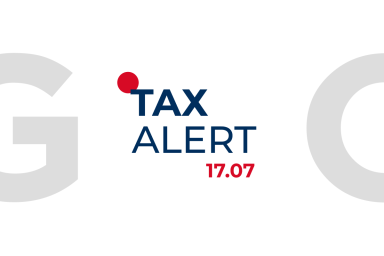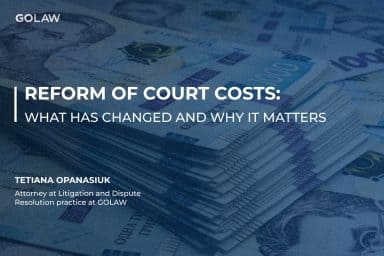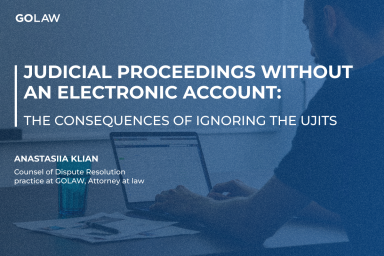Legislative news digest: LEGAL HOTLINE 04.01.2019
Tags
Contents
- SFS shall be divided again into tax and customs services
- Moratorium on the sale of agricultural land was continued for another year
- Marshall Law suspended in certain regions of Ukraine
- The NBU has updated its requirements regarding determination of related counterparties by banks
- List of offshore zones was extended
Legal news for your attention:
SFS shall be divided again into tax and customs services
The State Fiscal Service shall be reorganized by division into the State Tax and State Customs Services. The State Tax Service will also include the tax police units. This was reported by the press service of the Ministry of Finance.
The relevant Resolution was approved by the Cabinet of Ministers on December 18, 2018. The Resolution takes into account recommendations of the International Monetary Fund and tasks identified in the Medium-Term Priority Action Plan of the Government of Ukraine until 2020. The Government will coordinate activities of these Services through the Minister of Finance of Ukraine.
The SFS reorganization will be handled by a Commission headed by Deputy Minister of Finance Serhiy Verlanov. Within three months after approval of the Resolution, a competition will be held to select the Heads of newly created Services.
We remind that in July 2014 the SFS was assigned the functions of the Ministry of Revenue, and the Ministry of Revenue was formed by the Decree of the President dated December 24, 2012 by reorganization the State Tax Service and the State Customs Service.
Moratorium on the sale of agricultural land was continued for another year
The term of the moratorium on the alienation of agricultural lands has been extended for another year, until January 01, 2020.
The relevant Law “On Amendments to Section X “Transitional Provisions” of the Land Code of Ukraine on the Prolongation of Prohibition of Agricultural Land Alienation” (Draft Law No. 9355-5) was adopted by the Verkhovna Rada at the evening session on December 20, 2018.
New rules of currency regulation come into effect from February 07, 2019
The National Bank of Ukraine has made public all draft regulatory acts, which starting from February 07, 2019 will become the basis for a new currency regulation system provided for by the Law “On Currency and Currency transactions”.
Until the final transition to the full freedom of foreign exchange transactions, certain restrictions still will be applied, in particular:
- restriction of dividend repatriation to the amount of 7 million Euros per month and investments to 5 million Euros per month;
- prohibition of granting loans in UAH to non-residents;
- preservation of the requirement for mandatory sale of foreign currency earnings in the amount of 50%, etc.
- In addition, the possibility of conducting separate currency transactions will be expanded:
- deadlines to settle export-import transactions will be doubled (up to 365 days);
- an automated e-limit system will be introduced instead of individual currency licenses;
- currency control over foreign currency purchase and transfer transactions is being simplified for amounts under UAH 150 000;
- natural persons will be able to buy currency and bank metals online within the limits of UAH 150 000, etc.
Also, in 2019 the National Bank of Ukraine will introduce a new type of deposit certificates – a discount deposit certificate.
Marshall Law suspended in certain regions of Ukraine
On December 26, 2018, at 02:00 p.m. Marshall Law which was introduced in 10 regions of Ukraine for 30 days, ended. It should be reminded that this Law was introduced from 02:00 p.m. on November 26, 2018 by the Presidential Decree No. 393/2018.
In accordance with the Law No. 2630-VIII “On Approval of the Decree of the President of Ukraine “On the Introduction of Marshall Law in Ukraine”, adopted at an extraordinary session of the Verkhovna Rada of Ukraine on November 26, 2018, Marshall Law was imposed in Vinnytsa, Luhansk, Mykolaiv, Odesa, Sumy, Kharkiv, Chernihiv, as well as Donetsk, Zaporizhia, Kherson regions and inland waters of Ukraine of Azov-Kerch basin.
On November 26, 2018, the Verkhovna Rada of Ukraine has approved the Presidential Decree No. 393/2018 “On the Introduction of Marshall Law in Ukraine”. Subsequently, the President signed the relevant Law No. 2630-VIII.
The NBU has updated its requirements regarding determination of related counterparties by banks
Starting from July 01, 2019 the National Bank of Ukraine will introduce revised requirements regarding determination by the bank of related counterparties that have common economic risk, in its calculation of credit risk criteria.
This is formalized in the Resolution of the Board of the National Bank of Ukraine No. 139 “On Approval of the Amendments to the Instruction on Procedure for Regulating the Activities of Banks in Ukraine” dated December 18, 2018.
Existence of significant concentrations of credit risk for banks regarding certain counterparties may result in a material loss of the bank’s capital due to the appearance of financial problems of such counterparties. If the counterparties are linked legally or economically, then if there are problems with the fulfillment of obligations of one counterparty, there is a likelihood of similar problems of others.
According to the new requirements, banks should define a group of related counterparties, provided that such counterparties are linked by a control relationship or economic dependence. This obliges banks to thoroughly examine their counterparties: their ownership structure, business environment, financial reporting figures, etc.
The National Bank of Urkaine is also working in the direction of restricting banks’ lending to bank-related parties. It deals with the introduction of a requirement to reduce the regulatory capital of the bank by the amount of excess of the actual aggregate value of the bank related parties’ indebtedness over the maximum allowable value of such debt. This requirement shall come into force in 30 days after the official publication of the Resolution (January 18, 2019).
The Resolution entered into force on January 01, 2019 (some of the above rules will come into force on January 18 and July 01, 2019, respectively).
List of offshore zones was extended
The Government has determined legal basis for including certain states in the list of offshore zones.
The corresponding Order of the Cabinet of Ministers of Ukraine No. 1079-p was adopted at a Governmental Meeting on December 27, 2018.
List of offshore zones has also been updated to reflect data provided by the Global Forum on Transparency and Information Exchange for tax purposes and the OECD. In particular, the following states have been added to this list: Trinidad and Tobago, Namibia, Guam, Palau and American Samoa.
The list extension shall ensure the functioning of the financial monitoring system on prevention and counteraction to legalization (laundering) of the proceeds from crime, terrorism financing and financing of the proliferation of weapons of mass destruction.
Sign up to be aware
New achievements are inspired by information. GO further, don’t miss out GOLAW news and legal alerts
Our expertise
-
- Antitrust and Competition
- Banking and Finance
- Compliance, Corporate Governance and Risk Management
- Corporate and M&A
- Criminal and White Collar Defence
- Defense in Anti-corruption procedures and regulations
- Labor and Employment
- Natural Resources and Environment
- Government Relations (GR)
- Insolvency and Corporate Recovery
- Intellectual property
- International trade
- Legal support of business and private Сlients in Germany
- Litigation and dispute resolution
- Private clients
- Real Estate and Construction
- Energy and Natural Resources
- Restructuring, Claims and Recoveries
- Martial Law
- Tax and Customs
-
- Agribusiness
- Aviation
- Chemical industry
- Engineering, Construction and Building Materials
- Natural Resources and Environment
- Financial institutions
- IT and AI
- Industry and manufacturing
- Healthcare industries, Life sciences and Pharmaceuticals
- Media, Entertainment, Sports and Gambling
- Retail, FMCG and E-Commerce
- Transport and Logistics
We use cookies to improve performance of our website and your user experience.
Cookies policy
Cookies settings







